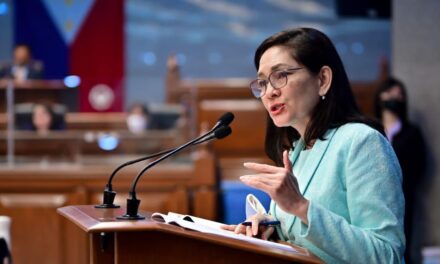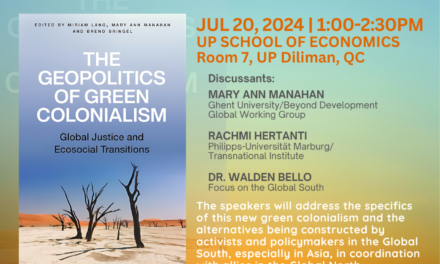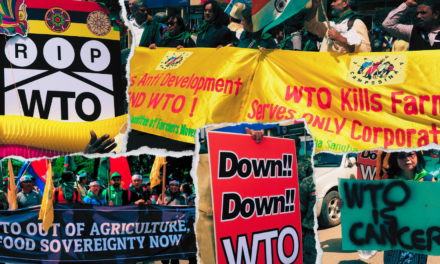By Walden Bello and Chanida Bamford
On April 1, 2003, in what was described as an effort to “reach out” to civil society, European Union Trade Commissioner Pascal Lamy met with representatives of several Bangkok-based NGOs at the riverfront Oriental Hotel. While the meeting did not produce fresh revelations on the ongoing World Trade Organization (WTO) negotiations, it nevertheless yielded interesting insights on the EU’s negotiating perspective, strategy, and tactics.
THE HARBINSON DRAFT: A TACTICAL BLUNDER
Not surprisingly, agriculture dominated the agenda of the brief one-hour meeting. Lamy had few nice things to say about the draft agreement on agriculture prepared by chief agricultural negotiator Stuart Harbinson. With negotiators in Geneva missing the March 31 deadline for agreement on the modalities of a new agreement, Lamy put the blame squarely on Harbinson, whom he charged with committing a “tactical mistake” for being “too precise” in his proposals for liberalization “at this stage of the discussion.” This was obviously referring to the tariff and subsidy cuts that Harbinson proposed, which the EU considers too deep.
“We don’t like the Harbinson draft,” Lamy declared flatly, and he went on to cite two reasons. “First,” he said, “it does not take into account non-trade concerns, such as sustainability, the link to the environment, rural landscape, and animal welfare. In agriculture, you do not just produce a commodity but also a service, a collective good that doesn’t belong to just anybody, which means you need not just trade policy but public policy.” The EU, in short, is not retreating on its stand on “multifunctionality.”
The second reason cited by Lamy was Harbinson’s lack of flexibility in dealing with EU subsidies and other forms of domestic support. According to him, the draft failed to recognize several trends. One, that EU export subsidies are one-fourth of what they were ten years ago. Two, that the EU offer is substantial — “fifty per cent reduction in domestic support, fifty per cent reduction in export subsidies, and increasing market access by one third.” Third, the Harbinson draft does not reflect appreciation of the fact while the US has been moving towards “market distorting” mechanisms to support its farming interests, the EU “has been moving towards non-trade distorting forms of subsidization by adopting Green Box measures like direct payments to farmers decoupled from production.”
Was there anything positive in the Harbinson draft? Yes, said Lamy, pointing to what he called the “food security box.” This proposal would allow developing countries to list a few “strategic products” which would be subject to less tariff reduction than other agricultural products. Unlike Lamy, it might be noted, many developing country representatives have dismissed it as a feeble concession that cannot balance the detrimental consequences of the comprehensive liberalization that their agricultural sectors will undergo.
Lamy was at pains to paint EU agriculture as sharing a similar dilemma as many developing economies. He claimed that like many developing economies, the EU was largely an importer when it came to agriculture. “We only export a bit,” he claimed, implying that the impact of its domestic support and export subsidies on global markets was limited.
EXPLOITING DEVELOPING COUNTRY DIFFERENCES
He went on to assert that two camps of developing countries had developed in the current agricultural negotiations: the big agro-exporters that were members of the Cairns Group and the other developing countries. “There’s Brazil, on the one hand, and there’s India,” he said. Brazil and Thailand were painted as strong promoters of liberalized trade, which Lamy doubted was in the interest of other developing countries. African countries, he claimed, “could not live with liberalized trade in agriculture.”
While Lamy claimed that there “has to be a compromise between these two camps,” in fact, the EU has moved quickly to exploit the conflict to fortify its negotiating position. On February 28, the EU, Norway, and Switzerland presented a statement signed by many developing countries, including India, endorsing a Uruguay Round formula for tariff cuts, which would provide more leeway in protecting sensitive products than the Harbinson formula. According to Focus on the Global South analyst Aileen Kwa, “this left the US and Cairns Group stumped and feeling quite isolated in their pro-liberalization approach.”
Moving to implementation issues, Lamy disagreed with the charge that the Doha Declaration put implementation issues-the top agenda item for developing countries-on the backburner. “In fact,” he contended, “the Doha Declaration integrated implementation issues for the first time as a central agenda item. This was the big prize for the developing countries.” He acknowledged, however, that negotiations on implementation had not gone forward, but he put the blame squarely on developing countries whom he claimed “could not agree on the top two or five implementation issues to be discussed.”
MANAGING EXPECTATIONS
Asked whether the current round of negotiations was threatened with derailment owing to lack of progress, Lamy affected not to be worried. On agriculture, he said, “we are only halfway in the negotiations-we have till the end of 2004.” There were different rates of progress in the different areas under negotiations, he said, with “some areas already one third done and others one two thirds done.” He cited the negotiations on Trade Related Intellectual Property Rights (TRIPs) as “98 per cent complete, with all of us knowing what that remaining two per cent is.” This was a rather bizarre way of describing the way the US has blocked any movement in negotiations with its demand that, contrary to the Doha Declaration’s broad intent, patent restrictions on the production and export of drugs be lifted only for a few specified diseases.
Lamy, it seemed, was in the early stages of managing expectations about the outcome of the Cancun Ministerial in September. A gap between the expectations of significant new liberalization that the EU trade commissioner himself has helped cultivate and actual meagre results would be a political disaster that would practically stymie negotiations in all other areas after Cancun and set the stage for the specter haunting Lamy and other free traders: the reversal of globalization.
* Walden Bello and Chanida Bamford are members of the Trade Campaign Team of Focus on the Global South.









